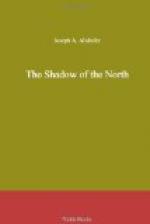“Do you remember any of your ancient history, Tayoga?” he asked. “Are the great deeds of the Greeks and Romans still in your mind?”
“At times they are, sir,” replied the young Onondaga.
“Um-m. Is that so? What was the date of the battle of Zama?”
“It was fought 202 B.C., sir.”
“You’re correct, but it must have been only a lucky guess. I’ll try you again. What was the date of the battle of Hastings?”
“It was fought 1066 A.D., sir.”
“Very good. Since you have answered correctly twice it must be knowledge and not mere surmise on your part. Robert, whom do you esteem the greatest of the Greek dramatic poets?”
“Sophocles, sir.”
“Why?”
“Because he combined the vigor and power of Aeschylus with the polish and refinement of Euripides.”
“Correct. I see that you remember what I told you, as you have quoted almost my exact words. And now, lads, be seated, while I order refreshments for you.”
“We thank you, sir,” said Robert, “but ’tis less than an hour since we almost ate ourselves to death at the house of Mynheer Jacobus Huysman.”
“A good man, Jacob, but too fat, and far too brusque in speech, especially to the young. I’ll warrant me he has been addressing upbraiding words to you, finding fault, perhaps, with your manners and your parts of speech.”
The two youths hid their smiles.
“Mynheer Jacobus was very good to us,” said Robert. “Just as you are, Master McLean.”
“I am not good to you, if you mean by it weakness and softness of heart. Never spoil the young. Speak sternly to them all the time. Use the strap and the rod freely upon them and you may make men of them.”
Again Robert and Tayoga hid their smiles, but each knew that he had a soft place in the heart of the crusty teacher, and they spent a pleasant hour with him. That night they slept in their old room at Mynheer Huysman’s and two days later they and Willet went on board a sloop for New York, where they intended to see Governor de Lancey. Before they left many more alarming reports about the French and Indians had come to Albany. They had made new ravages in the north and west, and their power was spreading continually. France was already helping her colonists. When would England help hers?
But Robert forgot all alarm in the pleasure of the voyage. It was a good sloop, it had a stout Dutch captain, and with a favoring wind they sped fast southward. Pride in the splendid river swelled in Robert’s soul and he and Tayoga, despite the cold, sat together on the deck, watching the lofty shores and the distant mountains.
But Willet, anxious of mind, paced back and forth. He had seen much at Albany that did not please him. The Indian Commissioners were doing little to cement the alliance with the Hodenosaunee. The Mohawks, alone of the great League, were giving aid against the French. The others remained in their villages, keeping a strict neutrality. That was well as far as it went, but the hunter had hoped that all the members of the Hodenosaunee would take the field for the English. He believed that Father Drouillard would soon be back among the Onondagas, seeking to sway his converts to France, and he dreaded, too, the activity and persistency of St. Luc.




